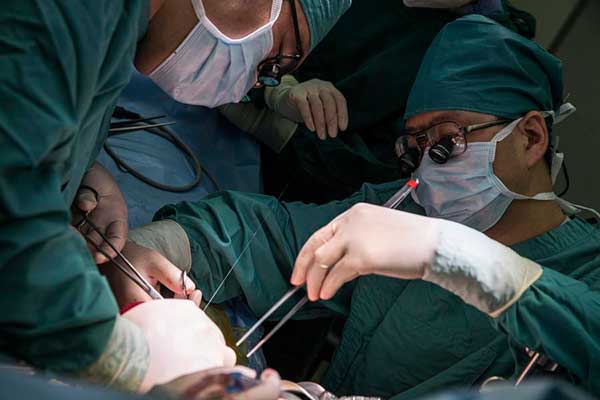China accelerates training in organ donation

 |
| [Photo/Xinhua] |
"I do."
These two words brought Liu Yuan, 38, a father of two boys, to the verge of tears. But it wasn't a wedding vow. The answer came from the relative of an organ donor.
In China, every after-death organ donation must get permission of family members. Since 2013, Liu has been a coordinator of organ donation at Beijing Youan Hospital, dealing with family approaches, organ donation and procurement, as well as funeral services.
From November of 2017, along with 21 other medical specialists from Shanghai, Beijing, Guangzhou, Kunming, Wuhan and Nanchang, he will train postgraduate students in organ donation and transplants.
Liu and his colleagues think the course is a key step for China to adopt a more professional approach to organ donation in line with international practice.
Skills Shortage
Liu, a liver transplant surgeon, had never been trained in organ donation before 2013.
He was reluctant to take the job at first and mistakenly thought the work of a coordinator was nothing more than "persuading people to donate". One of his colleagues quit without any donations over six months.
He bought books and took courses on sociability, in hope of better communicating with the families of patients.
The first organ donation he completed was over a drink. A 13-year-old girl with a brain tumor was declared brain dead, kept alive only by machine. But her family was reluctant to agree to donations.
Liu invited her father for a drink, and the two men formed a bond. Liu recalls how they cried all night, not only for the sufferings of the family, but also for a father's regrets.
His companionship and understanding worked. The next day, the father agreed to donate his daughter's liver, kidneys and corneas, helping at least three people.
In the past four years, Liu has completed more than 30 organ donations. But the failures "would be more than five times that number".
Liu thought the main impediment to donation was that many conservative elderly folks still firmly believed in the Chinese tradition of burying the dead intact. Liu says even his parents did not support organ donation.
He was abused and suspected of being involved in organ trafficking when he asked, "Do you agree to donate the patient's organs?"
China banned the use of organs from executed prisoners in 2015 and made voluntary donation the only legitimate source. With the system more fair and transparent, the number of organ donors is growing and public awareness is rising.
Around 10,000 people have donated 28,000 vital organs after death to date. A total of 4,080 people donated their organs in 2016, while in 2010 the number was only 34. Almost 300,000 Chinese have expressed a wish to donate their organs.
The country has also speeded up the training of doctors to overcome a skills shortage.
Liu has seen many intensive care medical staff fail to maintain the organ functions of potential donors, which led to organ failure and affected the quality of donations. This was due to lack of expertise, he believes.
Seven Chinese universities will offer postgraduate courses in organ donation and transplants, under the KeTLOD project (Knowledge Transfer and Leadership in Organ Donation from Europe to China). Co-founded by the European Commission and Chinese universities, it is expecting to enroll 140 postgraduate students from November.
Liver transplant specialist Xue Feng will teach the course at Shanghai Jiaotong University. It will fill a gap in China's medical education, he says.
"We have lagged behind Western countries for nearly three decades. We have to work harder."




































